Unit 4: Professional Practice in Education and Training Report
VerifiedAdded on 2023/01/05
|18
|6203
|6
Report
AI Summary
This report provides a comprehensive analysis of wider professional practice in education and training. It explores the concept of professionalism, including dual professionalism, and examines how professional values influence teaching practices. The report delves into the impact of social, political, and economic factors on education policy, analyzing their effects on curriculum and practices. It also investigates the roles of stakeholders and external bodies in education, emphasizing accountability and the importance of partnerships. Furthermore, the report presents quality improvement and assurance arrangements, including self-assessment and evaluation, and discusses areas for improvement in learning programs. The report also highlights the codes of conduct, national professional standards, and the significance of specialist teachers. References and a bibliography are included to support the findings.
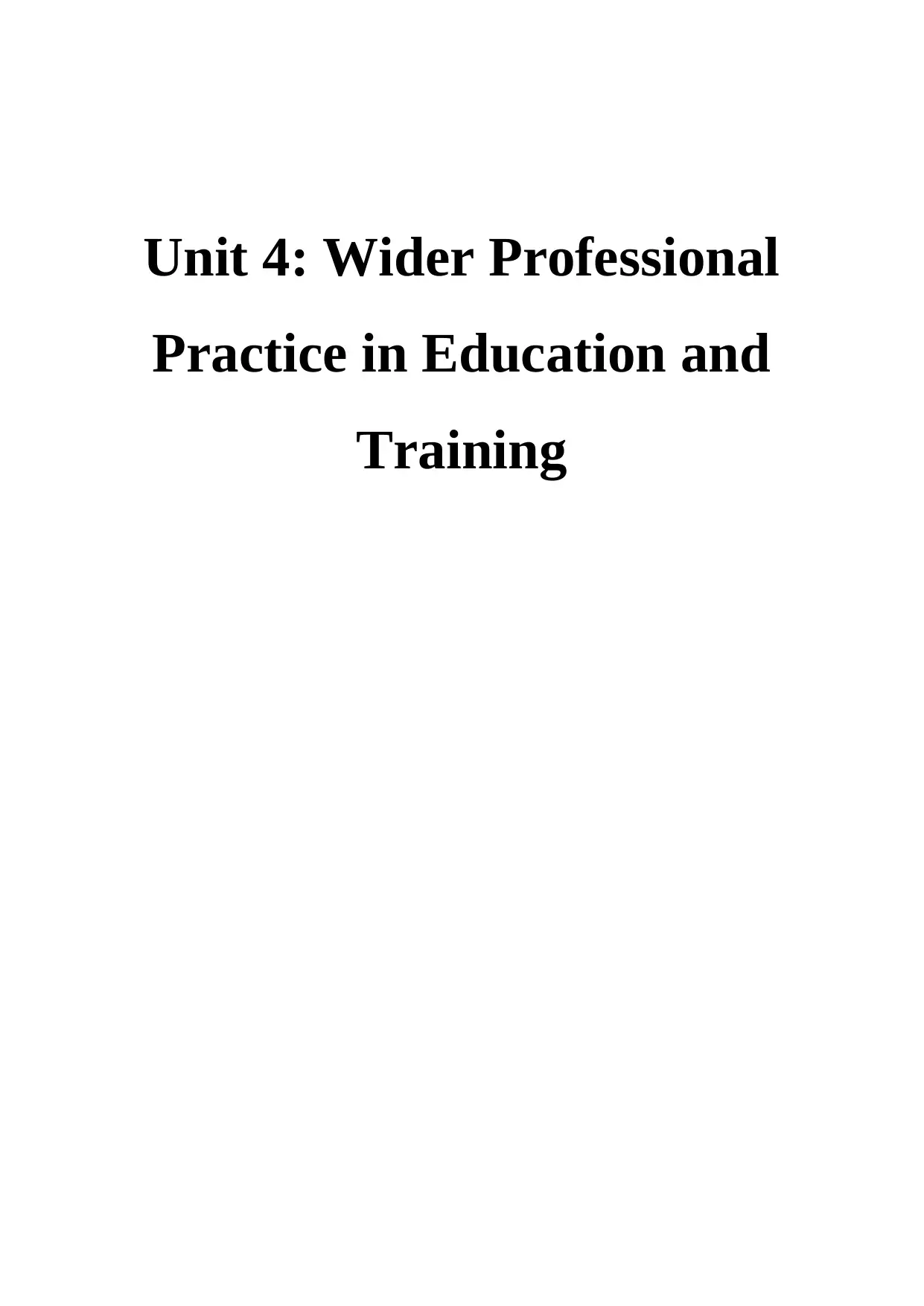
Unit 4: Wider Professional
Practice in Education and
Training
Practice in Education and
Training
Paraphrase This Document
Need a fresh take? Get an instant paraphrase of this document with our AI Paraphraser
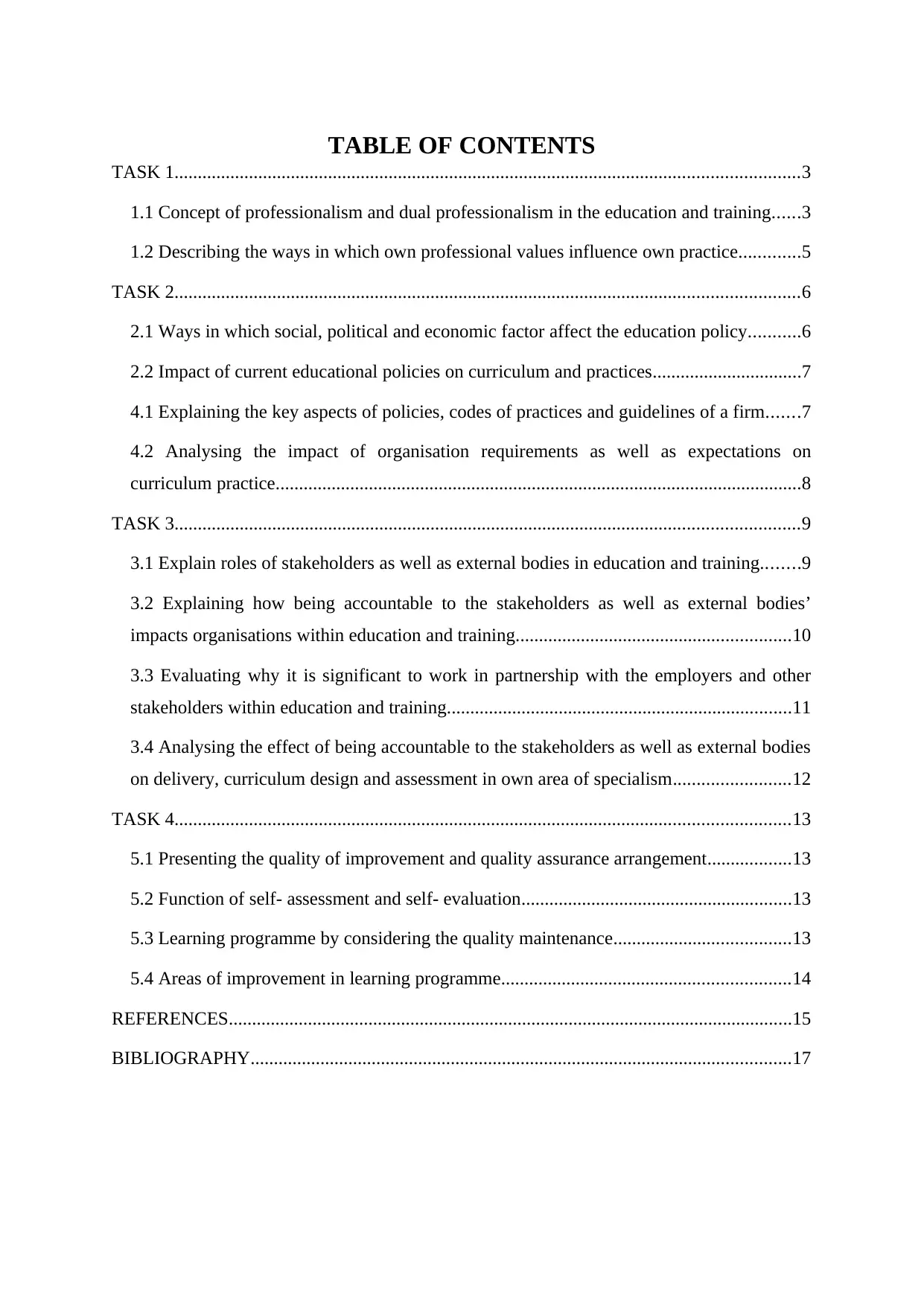
TABLE OF CONTENTS
TASK 1......................................................................................................................................3
1.1 Concept of professionalism and dual professionalism in the education and training......3
1.2 Describing the ways in which own professional values influence own practice.............5
TASK 2......................................................................................................................................6
2.1 Ways in which social, political and economic factor affect the education policy...........6
2.2 Impact of current educational policies on curriculum and practices................................7
4.1 Explaining the key aspects of policies, codes of practices and guidelines of a firm.......7
4.2 Analysing the impact of organisation requirements as well as expectations on
curriculum practice.................................................................................................................8
TASK 3......................................................................................................................................9
3.1 Explain roles of stakeholders as well as external bodies in education and training........9
3.2 Explaining how being accountable to the stakeholders as well as external bodies’
impacts organisations within education and training...........................................................10
3.3 Evaluating why it is significant to work in partnership with the employers and other
stakeholders within education and training..........................................................................11
3.4 Analysing the effect of being accountable to the stakeholders as well as external bodies
on delivery, curriculum design and assessment in own area of specialism.........................12
TASK 4....................................................................................................................................13
5.1 Presenting the quality of improvement and quality assurance arrangement..................13
5.2 Function of self- assessment and self- evaluation..........................................................13
5.3 Learning programme by considering the quality maintenance......................................13
5.4 Areas of improvement in learning programme..............................................................14
REFERENCES.........................................................................................................................15
BIBLIOGRAPHY....................................................................................................................17
TASK 1......................................................................................................................................3
1.1 Concept of professionalism and dual professionalism in the education and training......3
1.2 Describing the ways in which own professional values influence own practice.............5
TASK 2......................................................................................................................................6
2.1 Ways in which social, political and economic factor affect the education policy...........6
2.2 Impact of current educational policies on curriculum and practices................................7
4.1 Explaining the key aspects of policies, codes of practices and guidelines of a firm.......7
4.2 Analysing the impact of organisation requirements as well as expectations on
curriculum practice.................................................................................................................8
TASK 3......................................................................................................................................9
3.1 Explain roles of stakeholders as well as external bodies in education and training........9
3.2 Explaining how being accountable to the stakeholders as well as external bodies’
impacts organisations within education and training...........................................................10
3.3 Evaluating why it is significant to work in partnership with the employers and other
stakeholders within education and training..........................................................................11
3.4 Analysing the effect of being accountable to the stakeholders as well as external bodies
on delivery, curriculum design and assessment in own area of specialism.........................12
TASK 4....................................................................................................................................13
5.1 Presenting the quality of improvement and quality assurance arrangement..................13
5.2 Function of self- assessment and self- evaluation..........................................................13
5.3 Learning programme by considering the quality maintenance......................................13
5.4 Areas of improvement in learning programme..............................................................14
REFERENCES.........................................................................................................................15
BIBLIOGRAPHY....................................................................................................................17

⊘ This is a preview!⊘
Do you want full access?
Subscribe today to unlock all pages.

Trusted by 1+ million students worldwide
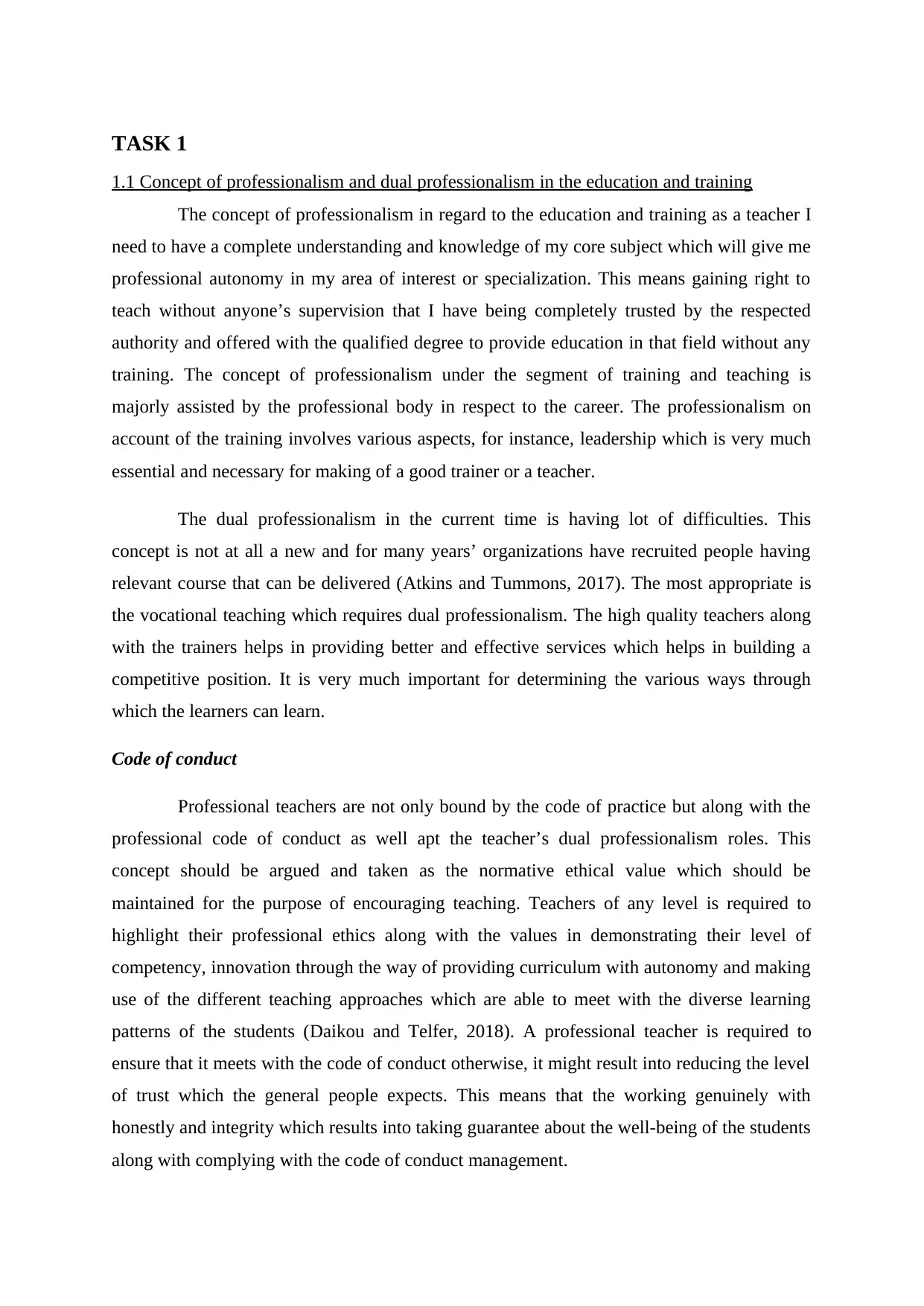
TASK 1
1.1 Concept of professionalism and dual professionalism in the education and training
The concept of professionalism in regard to the education and training as a teacher I
need to have a complete understanding and knowledge of my core subject which will give me
professional autonomy in my area of interest or specialization. This means gaining right to
teach without anyone’s supervision that I have being completely trusted by the respected
authority and offered with the qualified degree to provide education in that field without any
training. The concept of professionalism under the segment of training and teaching is
majorly assisted by the professional body in respect to the career. The professionalism on
account of the training involves various aspects, for instance, leadership which is very much
essential and necessary for making of a good trainer or a teacher.
The dual professionalism in the current time is having lot of difficulties. This
concept is not at all a new and for many years’ organizations have recruited people having
relevant course that can be delivered (Atkins and Tummons, 2017). The most appropriate is
the vocational teaching which requires dual professionalism. The high quality teachers along
with the trainers helps in providing better and effective services which helps in building a
competitive position. It is very much important for determining the various ways through
which the learners can learn.
Code of conduct
Professional teachers are not only bound by the code of practice but along with the
professional code of conduct as well apt the teacher’s dual professionalism roles. This
concept should be argued and taken as the normative ethical value which should be
maintained for the purpose of encouraging teaching. Teachers of any level is required to
highlight their professional ethics along with the values in demonstrating their level of
competency, innovation through the way of providing curriculum with autonomy and making
use of the different teaching approaches which are able to meet with the diverse learning
patterns of the students (Daikou and Telfer, 2018). A professional teacher is required to
ensure that it meets with the code of conduct otherwise, it might result into reducing the level
of trust which the general people expects. This means that the working genuinely with
honestly and integrity which results into taking guarantee about the well-being of the students
along with complying with the code of conduct management.
1.1 Concept of professionalism and dual professionalism in the education and training
The concept of professionalism in regard to the education and training as a teacher I
need to have a complete understanding and knowledge of my core subject which will give me
professional autonomy in my area of interest or specialization. This means gaining right to
teach without anyone’s supervision that I have being completely trusted by the respected
authority and offered with the qualified degree to provide education in that field without any
training. The concept of professionalism under the segment of training and teaching is
majorly assisted by the professional body in respect to the career. The professionalism on
account of the training involves various aspects, for instance, leadership which is very much
essential and necessary for making of a good trainer or a teacher.
The dual professionalism in the current time is having lot of difficulties. This
concept is not at all a new and for many years’ organizations have recruited people having
relevant course that can be delivered (Atkins and Tummons, 2017). The most appropriate is
the vocational teaching which requires dual professionalism. The high quality teachers along
with the trainers helps in providing better and effective services which helps in building a
competitive position. It is very much important for determining the various ways through
which the learners can learn.
Code of conduct
Professional teachers are not only bound by the code of practice but along with the
professional code of conduct as well apt the teacher’s dual professionalism roles. This
concept should be argued and taken as the normative ethical value which should be
maintained for the purpose of encouraging teaching. Teachers of any level is required to
highlight their professional ethics along with the values in demonstrating their level of
competency, innovation through the way of providing curriculum with autonomy and making
use of the different teaching approaches which are able to meet with the diverse learning
patterns of the students (Daikou and Telfer, 2018). A professional teacher is required to
ensure that it meets with the code of conduct otherwise, it might result into reducing the level
of trust which the general people expects. This means that the working genuinely with
honestly and integrity which results into taking guarantee about the well-being of the students
along with complying with the code of conduct management.
Paraphrase This Document
Need a fresh take? Get an instant paraphrase of this document with our AI Paraphraser
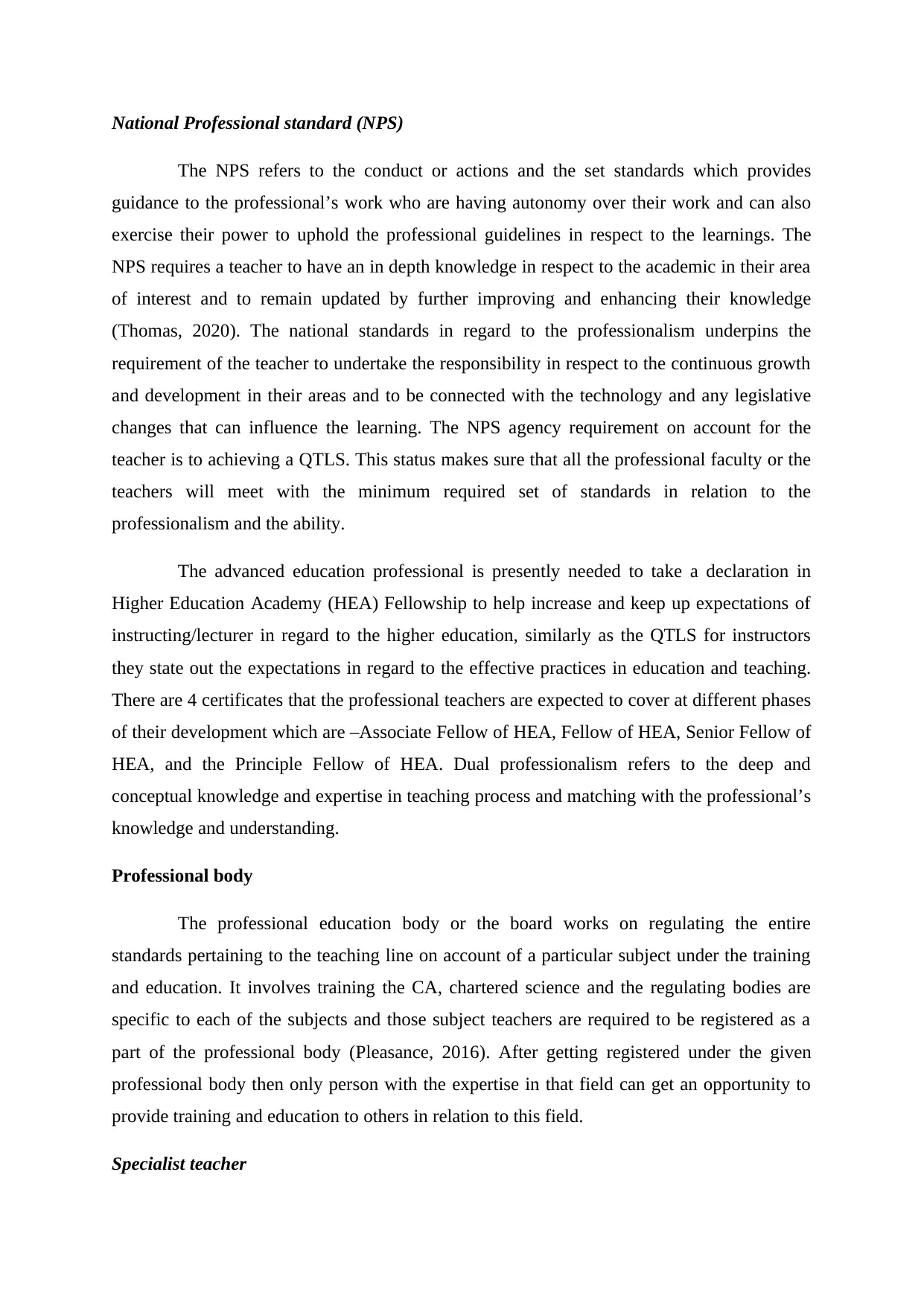
National Professional standard (NPS)
The NPS refers to the conduct or actions and the set standards which provides
guidance to the professional’s work who are having autonomy over their work and can also
exercise their power to uphold the professional guidelines in respect to the learnings. The
NPS requires a teacher to have an in depth knowledge in respect to the academic in their area
of interest and to remain updated by further improving and enhancing their knowledge
(Thomas, 2020). The national standards in regard to the professionalism underpins the
requirement of the teacher to undertake the responsibility in respect to the continuous growth
and development in their areas and to be connected with the technology and any legislative
changes that can influence the learning. The NPS agency requirement on account for the
teacher is to achieving a QTLS. This status makes sure that all the professional faculty or the
teachers will meet with the minimum required set of standards in relation to the
professionalism and the ability.
The advanced education professional is presently needed to take a declaration in
Higher Education Academy (HEA) Fellowship to help increase and keep up expectations of
instructing/lecturer in regard to the higher education, similarly as the QTLS for instructors
they state out the expectations in regard to the effective practices in education and teaching.
There are 4 certificates that the professional teachers are expected to cover at different phases
of their development which are –Associate Fellow of HEA, Fellow of HEA, Senior Fellow of
HEA, and the Principle Fellow of HEA. Dual professionalism refers to the deep and
conceptual knowledge and expertise in teaching process and matching with the professional’s
knowledge and understanding.
Professional body
The professional education body or the board works on regulating the entire
standards pertaining to the teaching line on account of a particular subject under the training
and education. It involves training the CA, chartered science and the regulating bodies are
specific to each of the subjects and those subject teachers are required to be registered as a
part of the professional body (Pleasance, 2016). After getting registered under the given
professional body then only person with the expertise in that field can get an opportunity to
provide training and education to others in relation to this field.
Specialist teacher
The NPS refers to the conduct or actions and the set standards which provides
guidance to the professional’s work who are having autonomy over their work and can also
exercise their power to uphold the professional guidelines in respect to the learnings. The
NPS requires a teacher to have an in depth knowledge in respect to the academic in their area
of interest and to remain updated by further improving and enhancing their knowledge
(Thomas, 2020). The national standards in regard to the professionalism underpins the
requirement of the teacher to undertake the responsibility in respect to the continuous growth
and development in their areas and to be connected with the technology and any legislative
changes that can influence the learning. The NPS agency requirement on account for the
teacher is to achieving a QTLS. This status makes sure that all the professional faculty or the
teachers will meet with the minimum required set of standards in relation to the
professionalism and the ability.
The advanced education professional is presently needed to take a declaration in
Higher Education Academy (HEA) Fellowship to help increase and keep up expectations of
instructing/lecturer in regard to the higher education, similarly as the QTLS for instructors
they state out the expectations in regard to the effective practices in education and teaching.
There are 4 certificates that the professional teachers are expected to cover at different phases
of their development which are –Associate Fellow of HEA, Fellow of HEA, Senior Fellow of
HEA, and the Principle Fellow of HEA. Dual professionalism refers to the deep and
conceptual knowledge and expertise in teaching process and matching with the professional’s
knowledge and understanding.
Professional body
The professional education body or the board works on regulating the entire
standards pertaining to the teaching line on account of a particular subject under the training
and education. It involves training the CA, chartered science and the regulating bodies are
specific to each of the subjects and those subject teachers are required to be registered as a
part of the professional body (Pleasance, 2016). After getting registered under the given
professional body then only person with the expertise in that field can get an opportunity to
provide training and education to others in relation to this field.
Specialist teacher
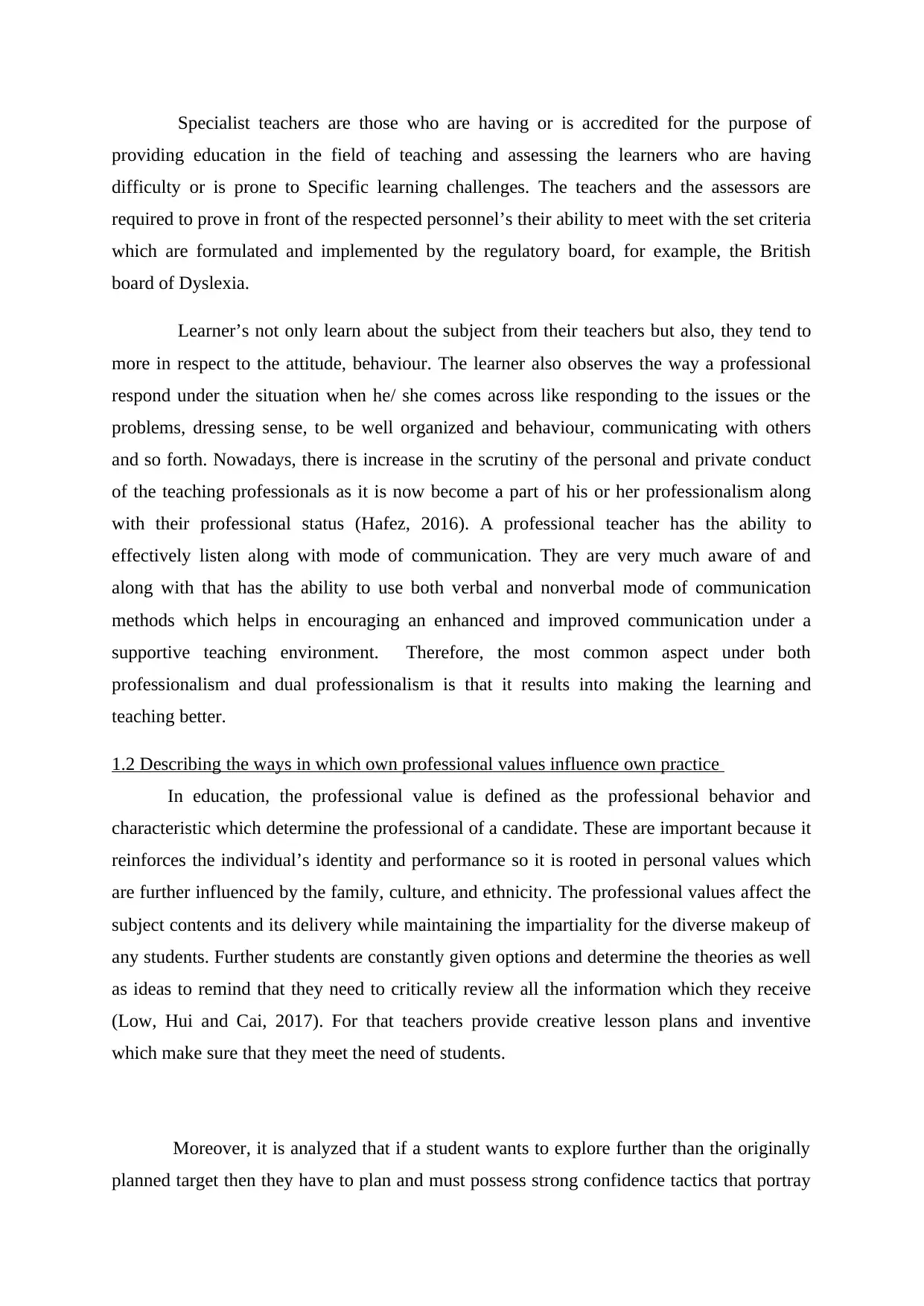
Specialist teachers are those who are having or is accredited for the purpose of
providing education in the field of teaching and assessing the learners who are having
difficulty or is prone to Specific learning challenges. The teachers and the assessors are
required to prove in front of the respected personnel’s their ability to meet with the set criteria
which are formulated and implemented by the regulatory board, for example, the British
board of Dyslexia.
Learner’s not only learn about the subject from their teachers but also, they tend to
more in respect to the attitude, behaviour. The learner also observes the way a professional
respond under the situation when he/ she comes across like responding to the issues or the
problems, dressing sense, to be well organized and behaviour, communicating with others
and so forth. Nowadays, there is increase in the scrutiny of the personal and private conduct
of the teaching professionals as it is now become a part of his or her professionalism along
with their professional status (Hafez, 2016). A professional teacher has the ability to
effectively listen along with mode of communication. They are very much aware of and
along with that has the ability to use both verbal and nonverbal mode of communication
methods which helps in encouraging an enhanced and improved communication under a
supportive teaching environment. Therefore, the most common aspect under both
professionalism and dual professionalism is that it results into making the learning and
teaching better.
1.2 Describing the ways in which own professional values influence own practice
In education, the professional value is defined as the professional behavior and
characteristic which determine the professional of a candidate. These are important because it
reinforces the individual’s identity and performance so it is rooted in personal values which
are further influenced by the family, culture, and ethnicity. The professional values affect the
subject contents and its delivery while maintaining the impartiality for the diverse makeup of
any students. Further students are constantly given options and determine the theories as well
as ideas to remind that they need to critically review all the information which they receive
(Low, Hui and Cai, 2017). For that teachers provide creative lesson plans and inventive
which make sure that they meet the need of students.
Moreover, it is analyzed that if a student wants to explore further than the originally
planned target then they have to plan and must possess strong confidence tactics that portray
providing education in the field of teaching and assessing the learners who are having
difficulty or is prone to Specific learning challenges. The teachers and the assessors are
required to prove in front of the respected personnel’s their ability to meet with the set criteria
which are formulated and implemented by the regulatory board, for example, the British
board of Dyslexia.
Learner’s not only learn about the subject from their teachers but also, they tend to
more in respect to the attitude, behaviour. The learner also observes the way a professional
respond under the situation when he/ she comes across like responding to the issues or the
problems, dressing sense, to be well organized and behaviour, communicating with others
and so forth. Nowadays, there is increase in the scrutiny of the personal and private conduct
of the teaching professionals as it is now become a part of his or her professionalism along
with their professional status (Hafez, 2016). A professional teacher has the ability to
effectively listen along with mode of communication. They are very much aware of and
along with that has the ability to use both verbal and nonverbal mode of communication
methods which helps in encouraging an enhanced and improved communication under a
supportive teaching environment. Therefore, the most common aspect under both
professionalism and dual professionalism is that it results into making the learning and
teaching better.
1.2 Describing the ways in which own professional values influence own practice
In education, the professional value is defined as the professional behavior and
characteristic which determine the professional of a candidate. These are important because it
reinforces the individual’s identity and performance so it is rooted in personal values which
are further influenced by the family, culture, and ethnicity. The professional values affect the
subject contents and its delivery while maintaining the impartiality for the diverse makeup of
any students. Further students are constantly given options and determine the theories as well
as ideas to remind that they need to critically review all the information which they receive
(Low, Hui and Cai, 2017). For that teachers provide creative lesson plans and inventive
which make sure that they meet the need of students.
Moreover, it is analyzed that if a student wants to explore further than the originally
planned target then they have to plan and must possess strong confidence tactics that portray
⊘ This is a preview!⊘
Do you want full access?
Subscribe today to unlock all pages.

Trusted by 1+ million students worldwide
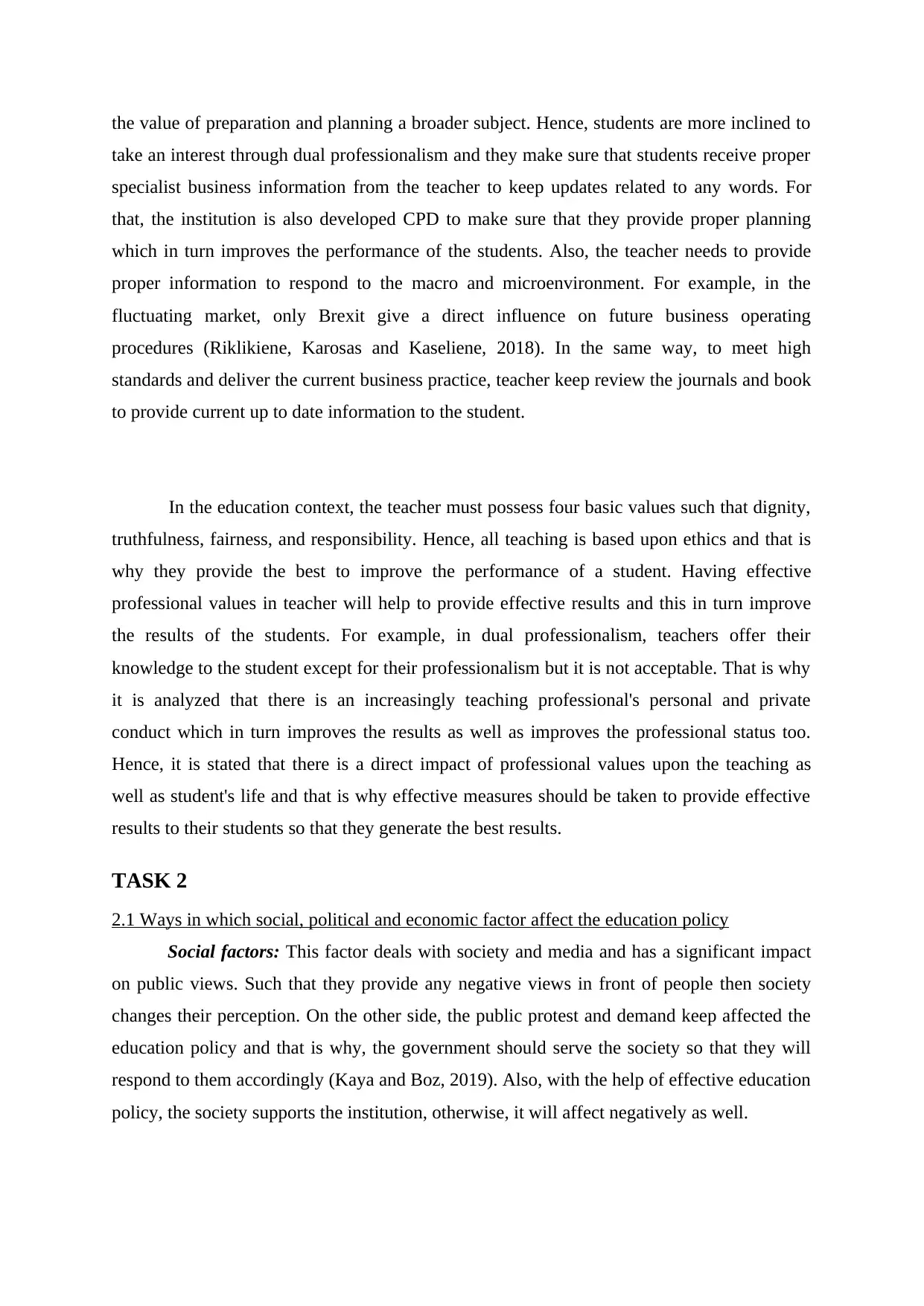
the value of preparation and planning a broader subject. Hence, students are more inclined to
take an interest through dual professionalism and they make sure that students receive proper
specialist business information from the teacher to keep updates related to any words. For
that, the institution is also developed CPD to make sure that they provide proper planning
which in turn improves the performance of the students. Also, the teacher needs to provide
proper information to respond to the macro and microenvironment. For example, in the
fluctuating market, only Brexit give a direct influence on future business operating
procedures (Riklikiene, Karosas and Kaseliene, 2018). In the same way, to meet high
standards and deliver the current business practice, teacher keep review the journals and book
to provide current up to date information to the student.
In the education context, the teacher must possess four basic values such that dignity,
truthfulness, fairness, and responsibility. Hence, all teaching is based upon ethics and that is
why they provide the best to improve the performance of a student. Having effective
professional values in teacher will help to provide effective results and this in turn improve
the results of the students. For example, in dual professionalism, teachers offer their
knowledge to the student except for their professionalism but it is not acceptable. That is why
it is analyzed that there is an increasingly teaching professional's personal and private
conduct which in turn improves the results as well as improves the professional status too.
Hence, it is stated that there is a direct impact of professional values upon the teaching as
well as student's life and that is why effective measures should be taken to provide effective
results to their students so that they generate the best results.
TASK 2
2.1 Ways in which social, political and economic factor affect the education policy
Social factors: This factor deals with society and media and has a significant impact
on public views. Such that they provide any negative views in front of people then society
changes their perception. On the other side, the public protest and demand keep affected the
education policy and that is why, the government should serve the society so that they will
respond to them accordingly (Kaya and Boz, 2019). Also, with the help of effective education
policy, the society supports the institution, otherwise, it will affect negatively as well.
take an interest through dual professionalism and they make sure that students receive proper
specialist business information from the teacher to keep updates related to any words. For
that, the institution is also developed CPD to make sure that they provide proper planning
which in turn improves the performance of the students. Also, the teacher needs to provide
proper information to respond to the macro and microenvironment. For example, in the
fluctuating market, only Brexit give a direct influence on future business operating
procedures (Riklikiene, Karosas and Kaseliene, 2018). In the same way, to meet high
standards and deliver the current business practice, teacher keep review the journals and book
to provide current up to date information to the student.
In the education context, the teacher must possess four basic values such that dignity,
truthfulness, fairness, and responsibility. Hence, all teaching is based upon ethics and that is
why they provide the best to improve the performance of a student. Having effective
professional values in teacher will help to provide effective results and this in turn improve
the results of the students. For example, in dual professionalism, teachers offer their
knowledge to the student except for their professionalism but it is not acceptable. That is why
it is analyzed that there is an increasingly teaching professional's personal and private
conduct which in turn improves the results as well as improves the professional status too.
Hence, it is stated that there is a direct impact of professional values upon the teaching as
well as student's life and that is why effective measures should be taken to provide effective
results to their students so that they generate the best results.
TASK 2
2.1 Ways in which social, political and economic factor affect the education policy
Social factors: This factor deals with society and media and has a significant impact
on public views. Such that they provide any negative views in front of people then society
changes their perception. On the other side, the public protest and demand keep affected the
education policy and that is why, the government should serve the society so that they will
respond to them accordingly (Kaya and Boz, 2019). Also, with the help of effective education
policy, the society supports the institution, otherwise, it will affect negatively as well.
Paraphrase This Document
Need a fresh take? Get an instant paraphrase of this document with our AI Paraphraser
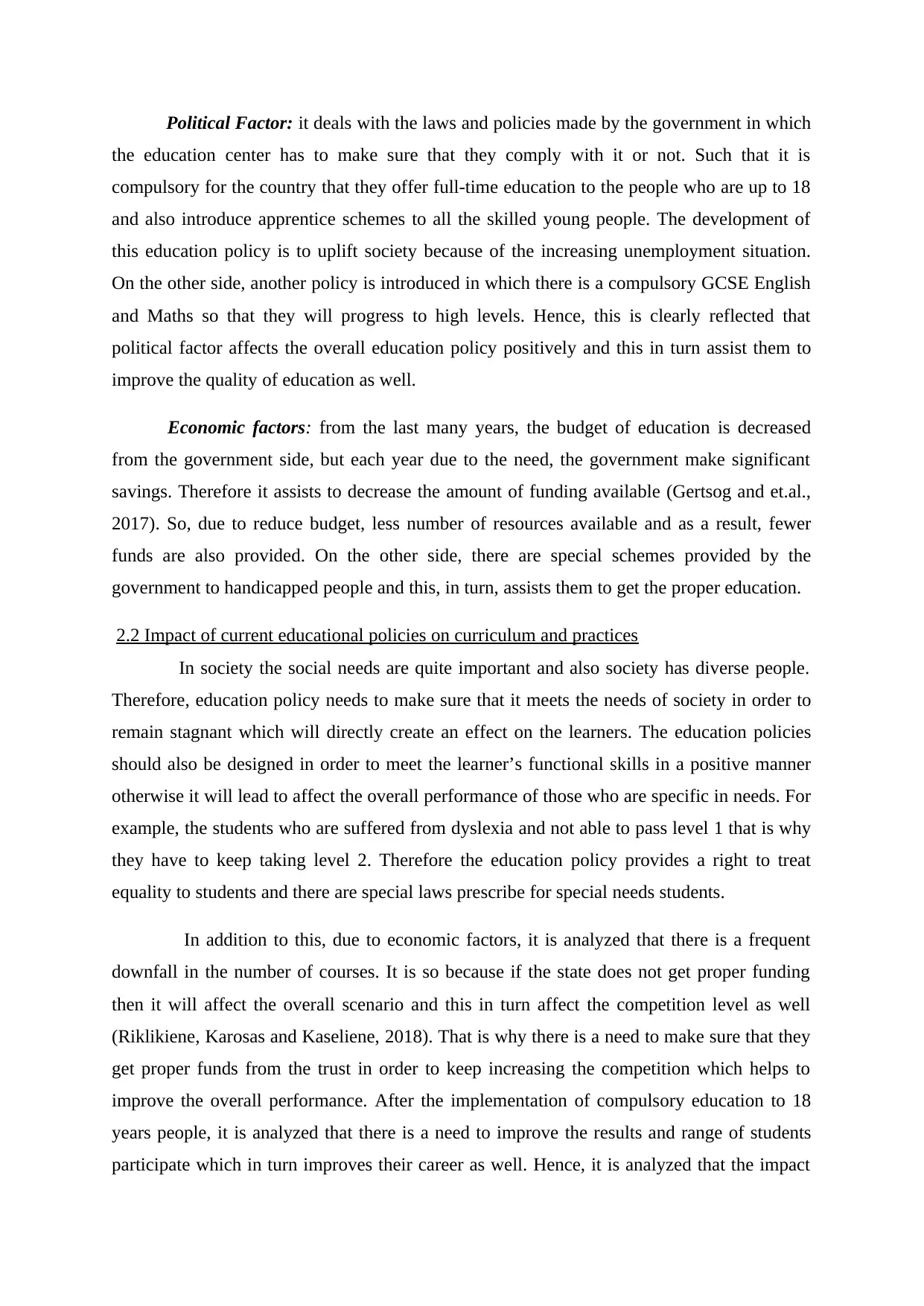
Political Factor: it deals with the laws and policies made by the government in which
the education center has to make sure that they comply with it or not. Such that it is
compulsory for the country that they offer full-time education to the people who are up to 18
and also introduce apprentice schemes to all the skilled young people. The development of
this education policy is to uplift society because of the increasing unemployment situation.
On the other side, another policy is introduced in which there is a compulsory GCSE English
and Maths so that they will progress to high levels. Hence, this is clearly reflected that
political factor affects the overall education policy positively and this in turn assist them to
improve the quality of education as well.
Economic factors: from the last many years, the budget of education is decreased
from the government side, but each year due to the need, the government make significant
savings. Therefore it assists to decrease the amount of funding available (Gertsog and et.al.,
2017). So, due to reduce budget, less number of resources available and as a result, fewer
funds are also provided. On the other side, there are special schemes provided by the
government to handicapped people and this, in turn, assists them to get the proper education.
2.2 Impact of current educational policies on curriculum and practices
In society the social needs are quite important and also society has diverse people.
Therefore, education policy needs to make sure that it meets the needs of society in order to
remain stagnant which will directly create an effect on the learners. The education policies
should also be designed in order to meet the learner’s functional skills in a positive manner
otherwise it will lead to affect the overall performance of those who are specific in needs. For
example, the students who are suffered from dyslexia and not able to pass level 1 that is why
they have to keep taking level 2. Therefore the education policy provides a right to treat
equality to students and there are special laws prescribe for special needs students.
In addition to this, due to economic factors, it is analyzed that there is a frequent
downfall in the number of courses. It is so because if the state does not get proper funding
then it will affect the overall scenario and this in turn affect the competition level as well
(Riklikiene, Karosas and Kaseliene, 2018). That is why there is a need to make sure that they
get proper funds from the trust in order to keep increasing the competition which helps to
improve the overall performance. After the implementation of compulsory education to 18
years people, it is analyzed that there is a need to improve the results and range of students
participate which in turn improves their career as well. Hence, it is analyzed that the impact
the education center has to make sure that they comply with it or not. Such that it is
compulsory for the country that they offer full-time education to the people who are up to 18
and also introduce apprentice schemes to all the skilled young people. The development of
this education policy is to uplift society because of the increasing unemployment situation.
On the other side, another policy is introduced in which there is a compulsory GCSE English
and Maths so that they will progress to high levels. Hence, this is clearly reflected that
political factor affects the overall education policy positively and this in turn assist them to
improve the quality of education as well.
Economic factors: from the last many years, the budget of education is decreased
from the government side, but each year due to the need, the government make significant
savings. Therefore it assists to decrease the amount of funding available (Gertsog and et.al.,
2017). So, due to reduce budget, less number of resources available and as a result, fewer
funds are also provided. On the other side, there are special schemes provided by the
government to handicapped people and this, in turn, assists them to get the proper education.
2.2 Impact of current educational policies on curriculum and practices
In society the social needs are quite important and also society has diverse people.
Therefore, education policy needs to make sure that it meets the needs of society in order to
remain stagnant which will directly create an effect on the learners. The education policies
should also be designed in order to meet the learner’s functional skills in a positive manner
otherwise it will lead to affect the overall performance of those who are specific in needs. For
example, the students who are suffered from dyslexia and not able to pass level 1 that is why
they have to keep taking level 2. Therefore the education policy provides a right to treat
equality to students and there are special laws prescribe for special needs students.
In addition to this, due to economic factors, it is analyzed that there is a frequent
downfall in the number of courses. It is so because if the state does not get proper funding
then it will affect the overall scenario and this in turn affect the competition level as well
(Riklikiene, Karosas and Kaseliene, 2018). That is why there is a need to make sure that they
get proper funds from the trust in order to keep increasing the competition which helps to
improve the overall performance. After the implementation of compulsory education to 18
years people, it is analyzed that there is a need to improve the results and range of students
participate which in turn improves their career as well. Hence, it is analyzed that the impact
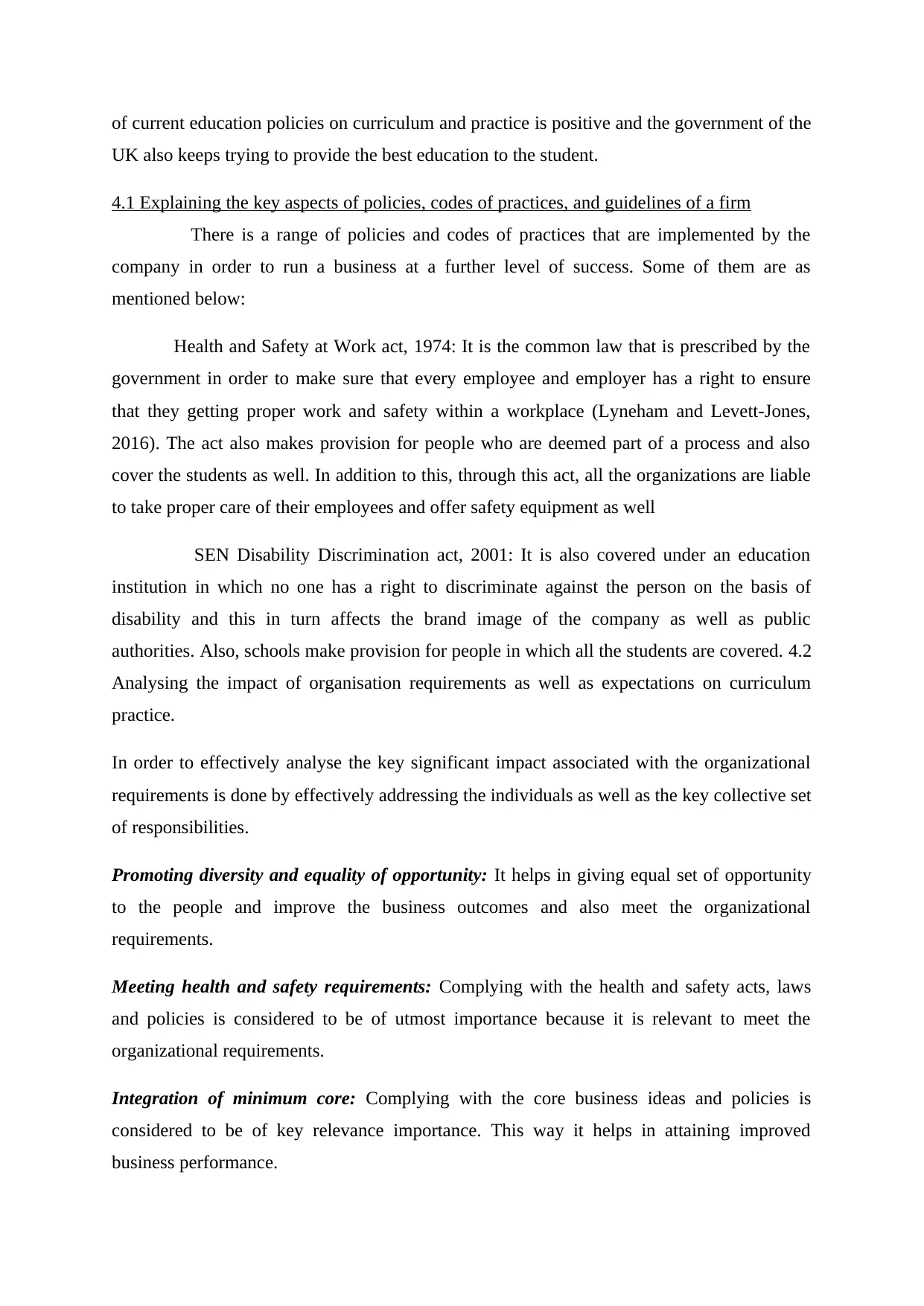
of current education policies on curriculum and practice is positive and the government of the
UK also keeps trying to provide the best education to the student.
4.1 Explaining the key aspects of policies, codes of practices, and guidelines of a firm
There is a range of policies and codes of practices that are implemented by the
company in order to run a business at a further level of success. Some of them are as
mentioned below:
Health and Safety at Work act, 1974: It is the common law that is prescribed by the
government in order to make sure that every employee and employer has a right to ensure
that they getting proper work and safety within a workplace (Lyneham and Levett-Jones,
2016). The act also makes provision for people who are deemed part of a process and also
cover the students as well. In addition to this, through this act, all the organizations are liable
to take proper care of their employees and offer safety equipment as well
SEN Disability Discrimination act, 2001: It is also covered under an education
institution in which no one has a right to discriminate against the person on the basis of
disability and this in turn affects the brand image of the company as well as public
authorities. Also, schools make provision for people in which all the students are covered. 4.2
Analysing the impact of organisation requirements as well as expectations on curriculum
practice.
In order to effectively analyse the key significant impact associated with the organizational
requirements is done by effectively addressing the individuals as well as the key collective set
of responsibilities.
Promoting diversity and equality of opportunity: It helps in giving equal set of opportunity
to the people and improve the business outcomes and also meet the organizational
requirements.
Meeting health and safety requirements: Complying with the health and safety acts, laws
and policies is considered to be of utmost importance because it is relevant to meet the
organizational requirements.
Integration of minimum core: Complying with the core business ideas and policies is
considered to be of key relevance importance. This way it helps in attaining improved
business performance.
UK also keeps trying to provide the best education to the student.
4.1 Explaining the key aspects of policies, codes of practices, and guidelines of a firm
There is a range of policies and codes of practices that are implemented by the
company in order to run a business at a further level of success. Some of them are as
mentioned below:
Health and Safety at Work act, 1974: It is the common law that is prescribed by the
government in order to make sure that every employee and employer has a right to ensure
that they getting proper work and safety within a workplace (Lyneham and Levett-Jones,
2016). The act also makes provision for people who are deemed part of a process and also
cover the students as well. In addition to this, through this act, all the organizations are liable
to take proper care of their employees and offer safety equipment as well
SEN Disability Discrimination act, 2001: It is also covered under an education
institution in which no one has a right to discriminate against the person on the basis of
disability and this in turn affects the brand image of the company as well as public
authorities. Also, schools make provision for people in which all the students are covered. 4.2
Analysing the impact of organisation requirements as well as expectations on curriculum
practice.
In order to effectively analyse the key significant impact associated with the organizational
requirements is done by effectively addressing the individuals as well as the key collective set
of responsibilities.
Promoting diversity and equality of opportunity: It helps in giving equal set of opportunity
to the people and improve the business outcomes and also meet the organizational
requirements.
Meeting health and safety requirements: Complying with the health and safety acts, laws
and policies is considered to be of utmost importance because it is relevant to meet the
organizational requirements.
Integration of minimum core: Complying with the core business ideas and policies is
considered to be of key relevance importance. This way it helps in attaining improved
business performance.
⊘ This is a preview!⊘
Do you want full access?
Subscribe today to unlock all pages.

Trusted by 1+ million students worldwide
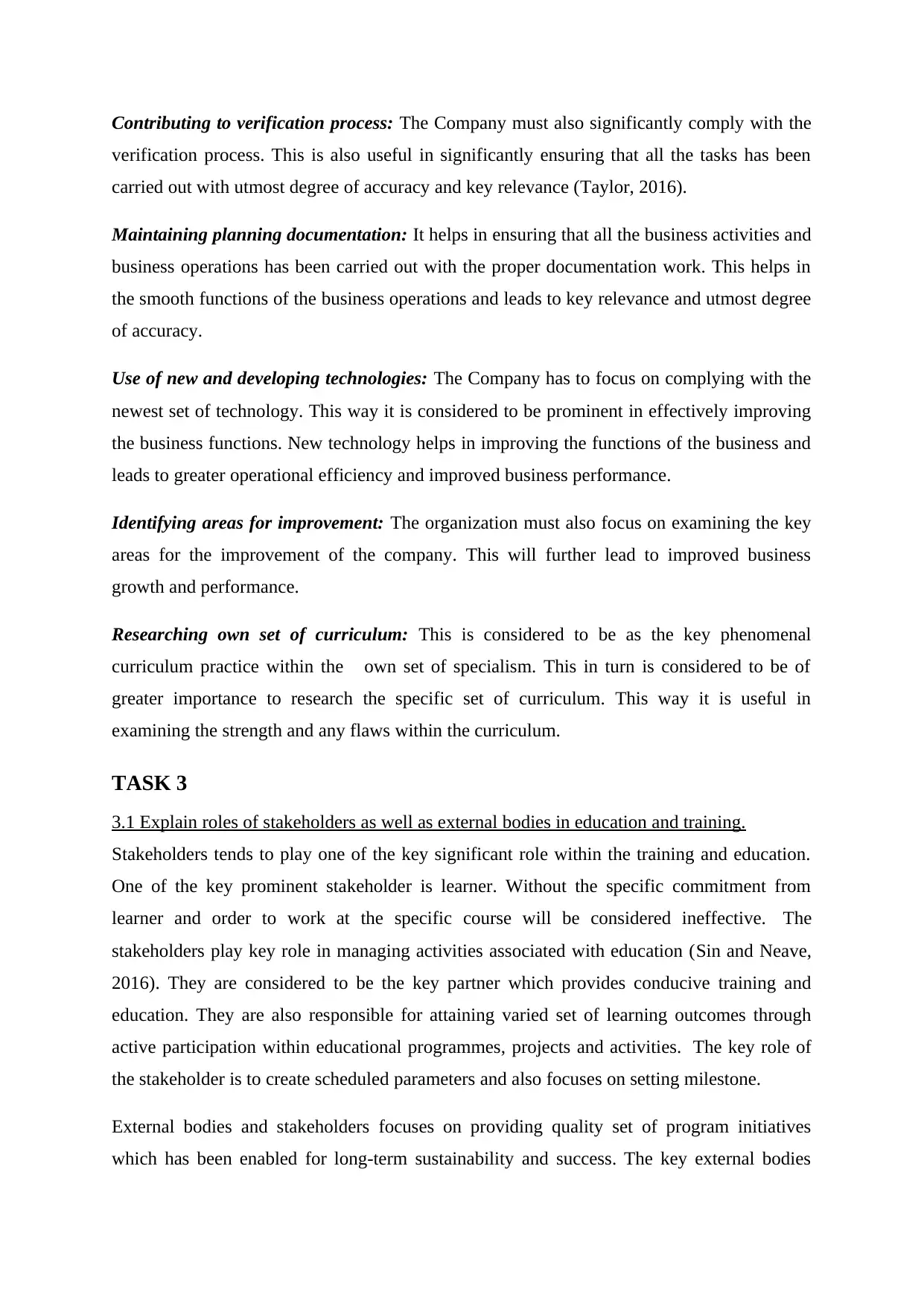
Contributing to verification process: The Company must also significantly comply with the
verification process. This is also useful in significantly ensuring that all the tasks has been
carried out with utmost degree of accuracy and key relevance (Taylor, 2016).
Maintaining planning documentation: It helps in ensuring that all the business activities and
business operations has been carried out with the proper documentation work. This helps in
the smooth functions of the business operations and leads to key relevance and utmost degree
of accuracy.
Use of new and developing technologies: The Company has to focus on complying with the
newest set of technology. This way it is considered to be prominent in effectively improving
the business functions. New technology helps in improving the functions of the business and
leads to greater operational efficiency and improved business performance.
Identifying areas for improvement: The organization must also focus on examining the key
areas for the improvement of the company. This will further lead to improved business
growth and performance.
Researching own set of curriculum: This is considered to be as the key phenomenal
curriculum practice within the own set of specialism. This in turn is considered to be of
greater importance to research the specific set of curriculum. This way it is useful in
examining the strength and any flaws within the curriculum.
TASK 3
3.1 Explain roles of stakeholders as well as external bodies in education and training.
Stakeholders tends to play one of the key significant role within the training and education.
One of the key prominent stakeholder is learner. Without the specific commitment from
learner and order to work at the specific course will be considered ineffective. The
stakeholders play key role in managing activities associated with education (Sin and Neave,
2016). They are considered to be the key partner which provides conducive training and
education. They are also responsible for attaining varied set of learning outcomes through
active participation within educational programmes, projects and activities. The key role of
the stakeholder is to create scheduled parameters and also focuses on setting milestone.
External bodies and stakeholders focuses on providing quality set of program initiatives
which has been enabled for long-term sustainability and success. The key external bodies
verification process. This is also useful in significantly ensuring that all the tasks has been
carried out with utmost degree of accuracy and key relevance (Taylor, 2016).
Maintaining planning documentation: It helps in ensuring that all the business activities and
business operations has been carried out with the proper documentation work. This helps in
the smooth functions of the business operations and leads to key relevance and utmost degree
of accuracy.
Use of new and developing technologies: The Company has to focus on complying with the
newest set of technology. This way it is considered to be prominent in effectively improving
the business functions. New technology helps in improving the functions of the business and
leads to greater operational efficiency and improved business performance.
Identifying areas for improvement: The organization must also focus on examining the key
areas for the improvement of the company. This will further lead to improved business
growth and performance.
Researching own set of curriculum: This is considered to be as the key phenomenal
curriculum practice within the own set of specialism. This in turn is considered to be of
greater importance to research the specific set of curriculum. This way it is useful in
examining the strength and any flaws within the curriculum.
TASK 3
3.1 Explain roles of stakeholders as well as external bodies in education and training.
Stakeholders tends to play one of the key significant role within the training and education.
One of the key prominent stakeholder is learner. Without the specific commitment from
learner and order to work at the specific course will be considered ineffective. The
stakeholders play key role in managing activities associated with education (Sin and Neave,
2016). They are considered to be the key partner which provides conducive training and
education. They are also responsible for attaining varied set of learning outcomes through
active participation within educational programmes, projects and activities. The key role of
the stakeholder is to create scheduled parameters and also focuses on setting milestone.
External bodies and stakeholders focuses on providing quality set of program initiatives
which has been enabled for long-term sustainability and success. The key external bodies
Paraphrase This Document
Need a fresh take? Get an instant paraphrase of this document with our AI Paraphraser
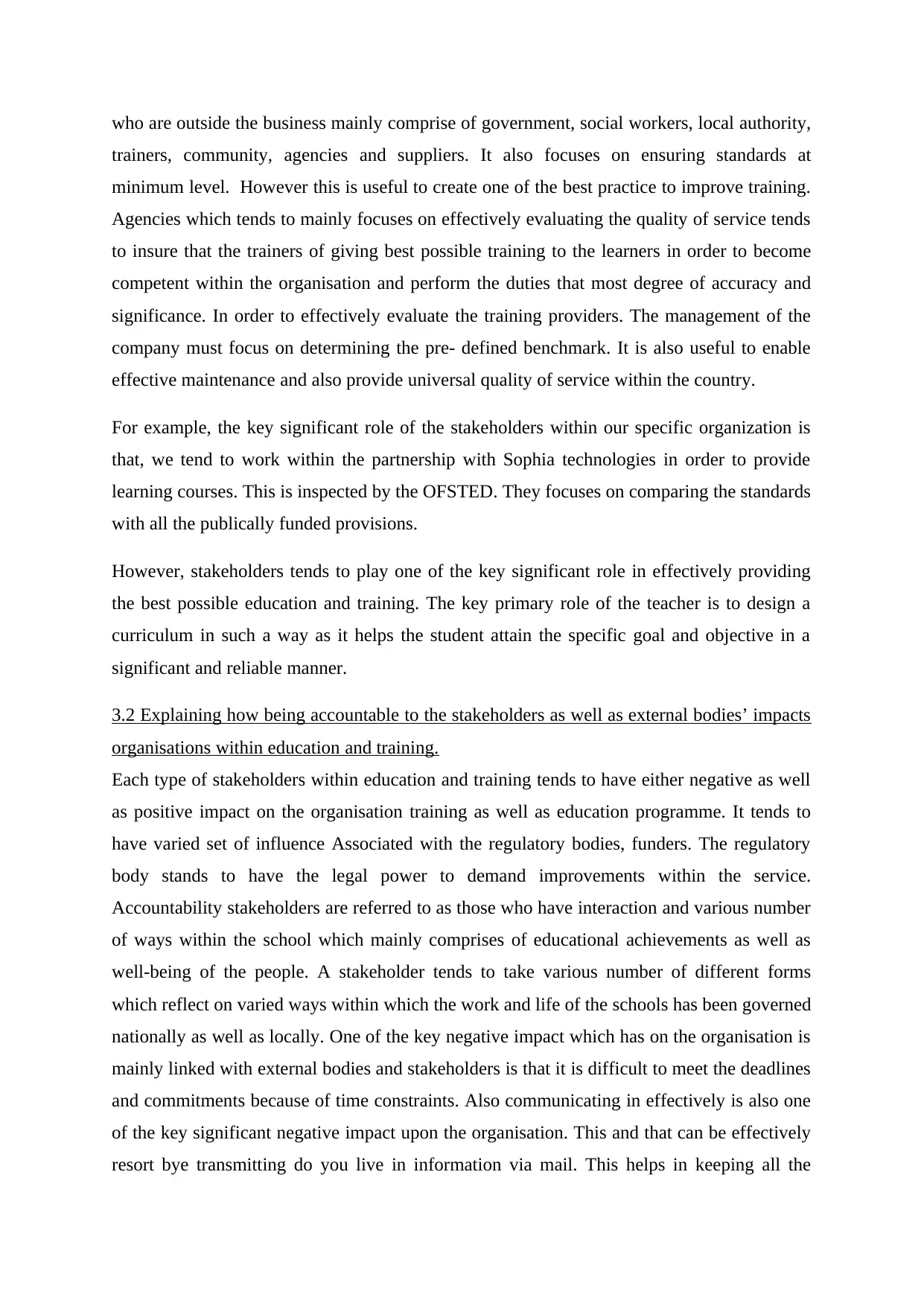
who are outside the business mainly comprise of government, social workers, local authority,
trainers, community, agencies and suppliers. It also focuses on ensuring standards at
minimum level. However this is useful to create one of the best practice to improve training.
Agencies which tends to mainly focuses on effectively evaluating the quality of service tends
to insure that the trainers of giving best possible training to the learners in order to become
competent within the organisation and perform the duties that most degree of accuracy and
significance. In order to effectively evaluate the training providers. The management of the
company must focus on determining the pre- defined benchmark. It is also useful to enable
effective maintenance and also provide universal quality of service within the country.
For example, the key significant role of the stakeholders within our specific organization is
that, we tend to work within the partnership with Sophia technologies in order to provide
learning courses. This is inspected by the OFSTED. They focuses on comparing the standards
with all the publically funded provisions.
However, stakeholders tends to play one of the key significant role in effectively providing
the best possible education and training. The key primary role of the teacher is to design a
curriculum in such a way as it helps the student attain the specific goal and objective in a
significant and reliable manner.
3.2 Explaining how being accountable to the stakeholders as well as external bodies’ impacts
organisations within education and training.
Each type of stakeholders within education and training tends to have either negative as well
as positive impact on the organisation training as well as education programme. It tends to
have varied set of influence Associated with the regulatory bodies, funders. The regulatory
body stands to have the legal power to demand improvements within the service.
Accountability stakeholders are referred to as those who have interaction and various number
of ways within the school which mainly comprises of educational achievements as well as
well-being of the people. A stakeholder tends to take various number of different forms
which reflect on varied ways within which the work and life of the schools has been governed
nationally as well as locally. One of the key negative impact which has on the organisation is
mainly linked with external bodies and stakeholders is that it is difficult to meet the deadlines
and commitments because of time constraints. Also communicating in effectively is also one
of the key significant negative impact upon the organisation. This and that can be effectively
resort bye transmitting do you live in information via mail. This helps in keeping all the
trainers, community, agencies and suppliers. It also focuses on ensuring standards at
minimum level. However this is useful to create one of the best practice to improve training.
Agencies which tends to mainly focuses on effectively evaluating the quality of service tends
to insure that the trainers of giving best possible training to the learners in order to become
competent within the organisation and perform the duties that most degree of accuracy and
significance. In order to effectively evaluate the training providers. The management of the
company must focus on determining the pre- defined benchmark. It is also useful to enable
effective maintenance and also provide universal quality of service within the country.
For example, the key significant role of the stakeholders within our specific organization is
that, we tend to work within the partnership with Sophia technologies in order to provide
learning courses. This is inspected by the OFSTED. They focuses on comparing the standards
with all the publically funded provisions.
However, stakeholders tends to play one of the key significant role in effectively providing
the best possible education and training. The key primary role of the teacher is to design a
curriculum in such a way as it helps the student attain the specific goal and objective in a
significant and reliable manner.
3.2 Explaining how being accountable to the stakeholders as well as external bodies’ impacts
organisations within education and training.
Each type of stakeholders within education and training tends to have either negative as well
as positive impact on the organisation training as well as education programme. It tends to
have varied set of influence Associated with the regulatory bodies, funders. The regulatory
body stands to have the legal power to demand improvements within the service.
Accountability stakeholders are referred to as those who have interaction and various number
of ways within the school which mainly comprises of educational achievements as well as
well-being of the people. A stakeholder tends to take various number of different forms
which reflect on varied ways within which the work and life of the schools has been governed
nationally as well as locally. One of the key negative impact which has on the organisation is
mainly linked with external bodies and stakeholders is that it is difficult to meet the deadlines
and commitments because of time constraints. Also communicating in effectively is also one
of the key significant negative impact upon the organisation. This and that can be effectively
resort bye transmitting do you live in information via mail. This helps in keeping all the
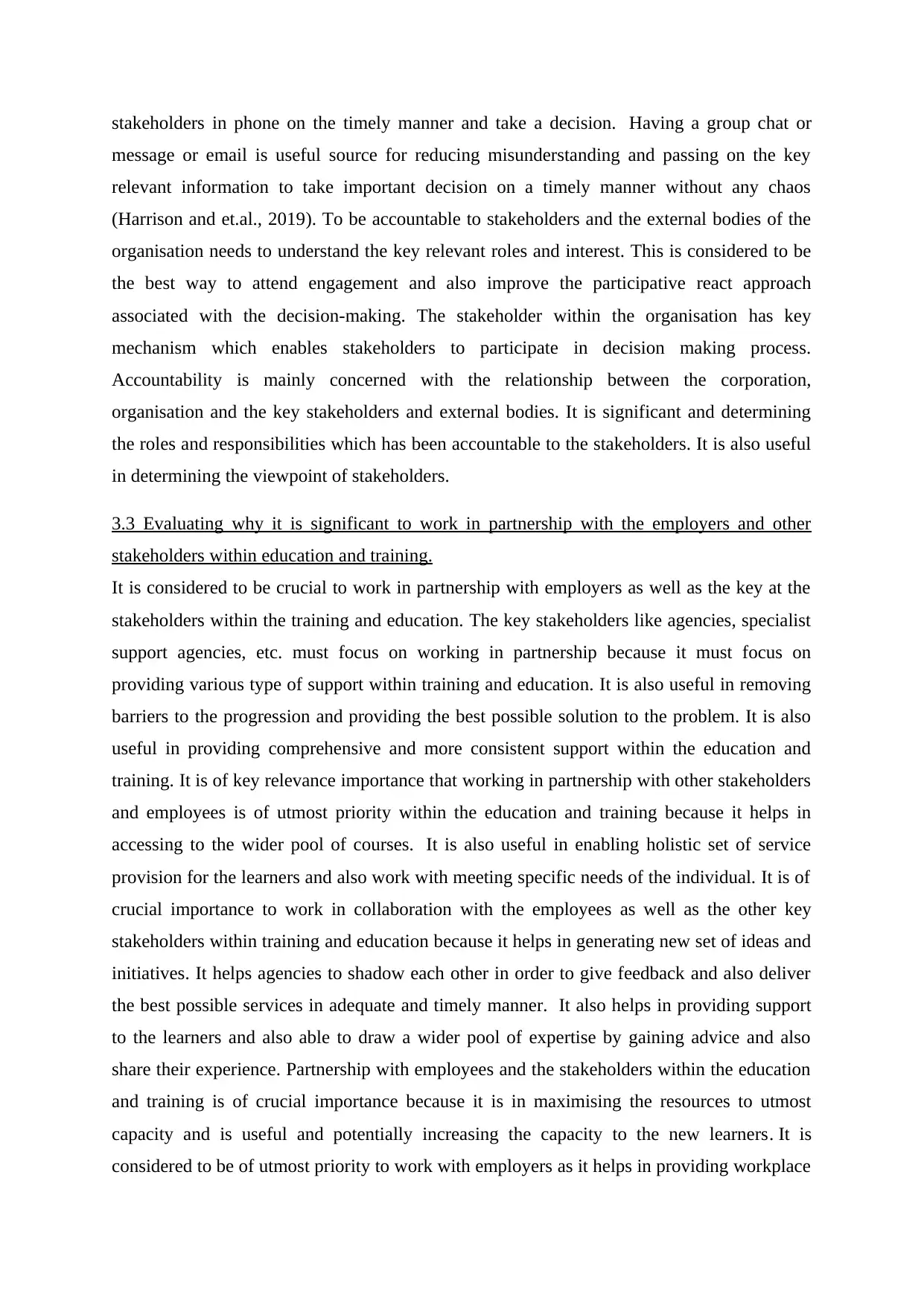
stakeholders in phone on the timely manner and take a decision. Having a group chat or
message or email is useful source for reducing misunderstanding and passing on the key
relevant information to take important decision on a timely manner without any chaos
(Harrison and et.al., 2019). To be accountable to stakeholders and the external bodies of the
organisation needs to understand the key relevant roles and interest. This is considered to be
the best way to attend engagement and also improve the participative react approach
associated with the decision-making. The stakeholder within the organisation has key
mechanism which enables stakeholders to participate in decision making process.
Accountability is mainly concerned with the relationship between the corporation,
organisation and the key stakeholders and external bodies. It is significant and determining
the roles and responsibilities which has been accountable to the stakeholders. It is also useful
in determining the viewpoint of stakeholders.
3.3 Evaluating why it is significant to work in partnership with the employers and other
stakeholders within education and training.
It is considered to be crucial to work in partnership with employers as well as the key at the
stakeholders within the training and education. The key stakeholders like agencies, specialist
support agencies, etc. must focus on working in partnership because it must focus on
providing various type of support within training and education. It is also useful in removing
barriers to the progression and providing the best possible solution to the problem. It is also
useful in providing comprehensive and more consistent support within the education and
training. It is of key relevance importance that working in partnership with other stakeholders
and employees is of utmost priority within the education and training because it helps in
accessing to the wider pool of courses. It is also useful in enabling holistic set of service
provision for the learners and also work with meeting specific needs of the individual. It is of
crucial importance to work in collaboration with the employees as well as the other key
stakeholders within training and education because it helps in generating new set of ideas and
initiatives. It helps agencies to shadow each other in order to give feedback and also deliver
the best possible services in adequate and timely manner. It also helps in providing support
to the learners and also able to draw a wider pool of expertise by gaining advice and also
share their experience. Partnership with employees and the stakeholders within the education
and training is of crucial importance because it is in maximising the resources to utmost
capacity and is useful and potentially increasing the capacity to the new learners. It is
considered to be of utmost priority to work with employers as it helps in providing workplace
message or email is useful source for reducing misunderstanding and passing on the key
relevant information to take important decision on a timely manner without any chaos
(Harrison and et.al., 2019). To be accountable to stakeholders and the external bodies of the
organisation needs to understand the key relevant roles and interest. This is considered to be
the best way to attend engagement and also improve the participative react approach
associated with the decision-making. The stakeholder within the organisation has key
mechanism which enables stakeholders to participate in decision making process.
Accountability is mainly concerned with the relationship between the corporation,
organisation and the key stakeholders and external bodies. It is significant and determining
the roles and responsibilities which has been accountable to the stakeholders. It is also useful
in determining the viewpoint of stakeholders.
3.3 Evaluating why it is significant to work in partnership with the employers and other
stakeholders within education and training.
It is considered to be crucial to work in partnership with employers as well as the key at the
stakeholders within the training and education. The key stakeholders like agencies, specialist
support agencies, etc. must focus on working in partnership because it must focus on
providing various type of support within training and education. It is also useful in removing
barriers to the progression and providing the best possible solution to the problem. It is also
useful in providing comprehensive and more consistent support within the education and
training. It is of key relevance importance that working in partnership with other stakeholders
and employees is of utmost priority within the education and training because it helps in
accessing to the wider pool of courses. It is also useful in enabling holistic set of service
provision for the learners and also work with meeting specific needs of the individual. It is of
crucial importance to work in collaboration with the employees as well as the other key
stakeholders within training and education because it helps in generating new set of ideas and
initiatives. It helps agencies to shadow each other in order to give feedback and also deliver
the best possible services in adequate and timely manner. It also helps in providing support
to the learners and also able to draw a wider pool of expertise by gaining advice and also
share their experience. Partnership with employees and the stakeholders within the education
and training is of crucial importance because it is in maximising the resources to utmost
capacity and is useful and potentially increasing the capacity to the new learners. It is
considered to be of utmost priority to work with employers as it helps in providing workplace
⊘ This is a preview!⊘
Do you want full access?
Subscribe today to unlock all pages.

Trusted by 1+ million students worldwide
1 out of 18
Related Documents
Your All-in-One AI-Powered Toolkit for Academic Success.
+13062052269
info@desklib.com
Available 24*7 on WhatsApp / Email
![[object Object]](/_next/static/media/star-bottom.7253800d.svg)
Unlock your academic potential
Copyright © 2020–2026 A2Z Services. All Rights Reserved. Developed and managed by ZUCOL.
